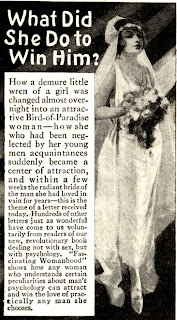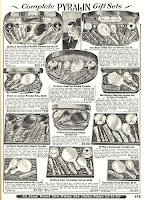
The 1920's.
"Flaming Youth."
Major changes in social life and morés, after World War I.
Wild behavior.
Contempt for the old values and the formal protocols of class divisions and relationships.
Fiction of the 1920's, published right there in the middle of it, can give a more vivid picture than any modern textbook. The Sun Also Rises and Gatsby are classic, and The Beautiful and Damned is, in my opinion a terrific book unjustly relegated to the B-list.

But popular fiction, much now out of print and forgotten, can also take you there. And it can be a lot of fun.
Arthur Train was a New York City Assistant District Attorney, lived in the middle of the Roar of the Twenties, and wrote about legal matters, and about society's collective nervous breakdown.

Train's novel, His Children's Children is, drat the luck, way too mired in the mind of its time to speak across the ages. But it was a serious novel by an intelligent, perceptive and often rather funny writer, whose unquestioning use of the n-word and other racist terms -- not as character insight but in an unthinking way -- ruins any chance it has for perpetual readership, other than as an artifact.
Then there's Beatrice Burton, a bestselling romance novelist of the Jazz Age. As society pretty much broke down after the gore and disillusionment of the First World War, a good contemporary romance had to acknowledge the attraction of life in the fast lane and still present the solid values.
In His Children's Children, a character is brought in merely to give an insightful but long speech about that societal breakdown. It's probably more interesting to us than it was to readers of the time, though at any time, halting the plot for an essay is a dreadful thing to do in fiction. Like I said, a classic, it's not.
This long-winded but wise character dismisses the idealistic pretext for the war, making the world "safe for democracy."
"We sent a million of them over for cannon-fodder to make the world safe for 'business as usual' and the ones who came back are wiser than when they went." he says. And further, he says, that postwar breakdown of the family harms the girls more than it does the boys:
"The reason the boys, as a whole, are nicer than the girls is that the majority of them have been educated at boarding schools, away from their parents. ... You can hire a social secretary to 'bring out' your daughter for you, but you can't hire a woman to be a mother to her and expect to build up moral character at so much per month."
In Train's novel, the daughters are indulged and neglected by wealthy parents, especially a mother who means well but can't see past social success as an avenue to happiness. That's actually about as traditional a value as you can get. A woman's worth determined by the marriage she makes is archaism at its finest. And Train makes it look like the bad idea it is, especially in the eldest daughter's desperately unhappy entrapment in a posh marriage to an English nobleman.
In Burton's novels, the flapper heroines are actually from solid working/middle-class homes with solid parenting, but are lured by the glitter of the high life. Readers could relate to the immature young women in Burton's books -- girls, really -- who craved glamorous material goods, chafed at budgeting, felt caged and bored when told to sit at home instead of going out with some fun-loving boy in his fast and flashy car.
All of these Burton books are practically the same book. Plot elements change, but her baseline plot is one in which a flighty young lady fails to appreciate a hardworking man who loves her and who meets her flirting, overspending and neglect of the home with almost endless patience. When he's on the verge of giving up, she comes to her senses and all is well. In one case (Footloose) she's driven her previous husband to suicide (Nah, no guilt trip there for readers!), but it's still not too late for her to make a life with a Good Man if she wises up.

In several books, the Object of Desire
that symbolizes all to which our heroine
aspires, is a silver toilet set :
sold as gift sets, these featured
brush, comb, hand mirror and often
other grooming accessories.
She's an ordinary girl who owns
the standard "ivorette" or "pyralin"
(both are terms for celluloid) set
that was sold to many a farm and
working class family through Sears
and Montgomery Ward catalogs. The Burton heroine looks down on her Sears lifestyle and wants the Fifth Avenue goods that the equally unhappy heroines of Arthur Train's novel have by the trunkful.

The prices of the high-end goods are just readable at maximum zoom --
But if you can't make them out, the Fifth Avenue suit prices are: $165.00 ; 89.50; and 98.50. In 1923 dollars!
We, the readers, know how hard the father (for single-gal Burton heroines still at home) or the newlywed husband works to give her the nicest things he can, and we hurt for them, especially for the husband, as she spends him into the poorhouse, running up debt on clothes and perfumes and in one case, her own snappy roadster. Through various means, she grows up. She realizes how stupid her values are, how much she has hurt those she loves, and she settles into an appreciation of making dinners and of evenings at home sewing by the hearth with her rat-race-exhausted, but now-happy husband.
Happiness is easy to come by. A young lady reading these books undoubtedly felt that these fine, responsible guys were everywhere, despairing of all the flighty good-time girls and wishing for a good woman. And that all she had to do was to keep a good house, love the celluloid hairbrush because he gave it to her, mend her much-worn frocks, and have such a great guy fall at her feet.
Burton's plots and characters are simple and largely unshaded, but she's smart enough to address women's rootlessness while she provides a simple Return To Domesticity as the healer for it. She acknowledges the attractions that the fast new world holds for girls who have no sense of purpose in this cynical jaded society. But she also brings an essentially smart insight that throwing out the hypocrisy of Victorian society doesn't mean throwing out all commitment, work ethic and honesty, an insight which probably rang true to readers who'd danced at the parties and done the petting and found themselves feeling that life needed something of more substance.
And in Train's novel, Domesticity is also the answer. The eldest daughter in the abusive upper-crust marriage must content herself with motherhood, raising her children in America and remaining legally fettered to an odious husband. Lifelong celibacy is the only honorable option.
So there you have it. Women hunger for something of substance, but to both authors, it lies in the home. In Train's serious novel and in Burton's formulaic ones, the answer is for women to go backward into domesticity, not forward into -- duh !-- education for expansion of the mind and heart. This, even though Train perceived the value education had for the souls of boys.
The Good Ol' Days? Not by a long shot!
------
SOURCES:
Top illustration is from an ad for an advice book to young women,
entitled Secrets of Fascinating Womanhood.
The ad is found in the June, 1924, issue of Modern Priscilla magazine,
THE magazine of homemaking how-to.
Pyralin items catalog page is from:
1927 Edition of the Sears, Roebuck Catalog: The Roaring Twenties.
Edited by Alan Mirken. Bounty Books, 1970. LC number: 78-108061
Suit illustrations:
Franklin Simon Fashion Catalog for 1923.
Dover Publications, c.1993. ISBN: 0-486-27854-9
and
Everyday Fashions of the Twenties, as Pictured in Sears and Other Catalogs.
Edited by Stella Blum. Dover Publications, 1981. ISBN: 0-486-24134-3
No comments:
Post a Comment